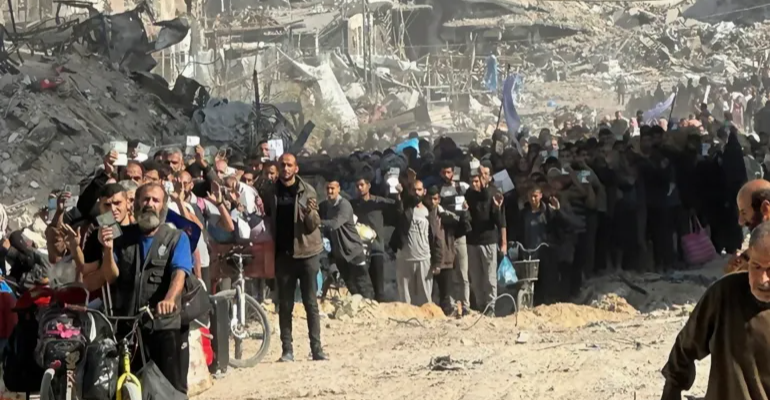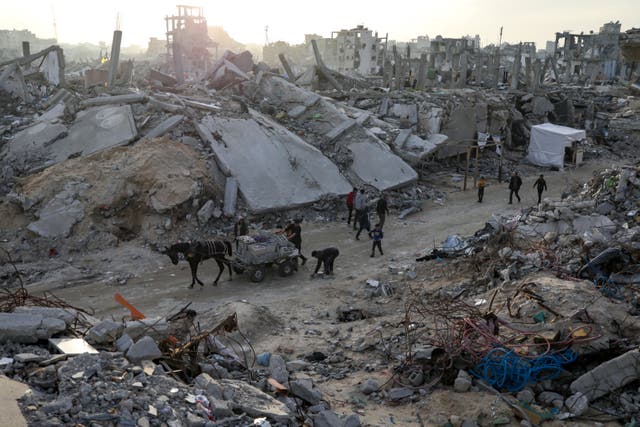Oxfam Warns Gaza’s Water Crisis Deepens Amid Reported Waterborne Diseases
DayofPal– The humanitarian crisis in Gaza is escalating as water shortages reach critical levels, fueling a surge in disease and deepening an already dire health catastrophe, according to Oxfam organization.
Oxfam reports that Palestinians in both northern and southern Gaza are now surviving on less than 7% of the water available before the war, with devastation to water infrastructure leaving families desperate for even a single drop.
In North Gaza, encompassing areas like Jabalia, Beit Hanoon, and Beit Lahiya, the destruction has been near-total, with almost all water wells rendered inoperable.
The situation in the southern Rafah governorate is equally grim with over 90% of wells and reservoirs having been damaged, leaving water production at just five% of its previous capacity.
Even as efforts to restore water systems continue following the ceasefire, the damage to Gaza’s pipelines has resulted in catastrophic losses.
Oxfam estimates that 60% of water is leaking into the ground instead of reaching homes, leaving densely areas without the most basic necessity for survival.
Clemence Lagouardat, Oxfam’s humanitarian head of response in Gaza, said “Now that the bombs have stopped, we are only beginning to grasp the sheer scale of destruction to Gaza’s water and sanitation infrastructure.”
“Most vital networks have been entirely lost or paralyzed, creating catastrophic hygiene and health conditions,” he added.
The consequences are harrowing. Oxfam describes desperate scenes where people plead for water in the streets, and parents forego drinking so their children can have the little that remains. Some children are walking miles just to fill a single jerrycan.
With safe water scarce, waterborne diseases are spreading at an alarming rate. A World Health Organization (WHO) study found that 88 percent of environmental samples tested across Gaza were contaminated with polio, warning of an imminent outbreak.
Other infectious diseases, including acute watery diarrhea and respiratory infections—now the leading causes of death—are surging, with 46,000 cases reported weekly, primarily among children.
Chickenpox, scabies, and impetigo are also rampant, particularly among displaced families in the hardest-hit northern areas. Overflowing sewage, lack of sanitation, and overcrowded living conditions are accelerating the crisis.
“Rebuilding water and sanitation is vital for Gaza to have a path to normalcy after 15 months of horror,” said Lagouardat. “The ceasefire must hold, and fuel and aid must flow so that Palestinians can rebuild their lives.”
As Gaza’s residents battle both the physical and humanitarian aftermath of war, the urgent call for aid, fuel, and restoration of water infrastructure grows louder. Without immediate intervention, the enclave risks plunging further into an unprecedented public health disaster.
Shortlink for this post: https://daysofpalestine.ps/?p=60703

Palestinians walk past tents lining the streets amid the rubble of destroyed buildings in Jabalia, in the northern Gaza Strip on February 18, 2025, as people return to northern parts of Gaza during a current ceasefire deal in the war between Israel and Hamas. (AFP)
19 February 2025
The World Bank, United Nations and the European Union are pointing to a formidable international reconstruction effort ahead for Gaza, which they estimate will cost $53.2 billion.
“Funding will require a broad coalition of donors, diverse financing instruments, private sector resources and significant improvements in the delivery of reconstruction materials to Gaza,” said the report released Tuesday.
The organizations said they would work with partners to devise a “strategic plan” to oversee the recovery and reconstruction.
The report identified almost $30 billion in damage as a result of the war — with nearly half of that due to destruction of homes. The war has displaced an estimated 90% of Gaza’s population, and since a ceasefire took effect last month, many displaced Palestinians have returned to find their former homes in ruins.
The report said Gaza would require about $20 billion for recovery and reconstruction needs over the next three years.
It says an additional $33 billion will be needed in the long term, including funds to rebuild the territory’s social and health services and the battered economy.

1 of 3
U.S. Secretary of State Marco Rubio walks with United Arab Emirates President Sheikh Mohamed bin Zayed Al Nahyan as they meet at ADNEC Centre Abu Dhabi in Abu Dhabi, United Arab Emirates, February 19, 2025. REUTERS/Evelyn Hockstein/Pool

2 of 3
U.S. Secretary of State Marco Rubio walks with United Arab Emirates President Sheikh Mohamed bin Zayed Al Nahyan as they meet at ADNEC Centre Abu Dhabi in Abu Dhabi, United Arab Emirates, February 19, 2025. REUTERS/Evelyn Hockstein/Pool

3 of 3
U.S. Secretary of State Marco Rubio walks with United Arab Emirates President Sheikh Mohamed bin Zayed Al Nahyan as they meet at ADNEC Centre Abu Dhabi in Abu Dhabi, United Arab Emirates, February 19, 2025. REUTERS/Evelyn Hockstein/Pool››
UPDATED Feb 19, 2025,
DUBAI - The United Arab Emirates leader told the United States' secretary of state on Wednesday that his country rejects a proposal to displace Palestinians from their land, the Emirati state news agency WAM reported.
President Sheikh Mohammed bin Zayed Al Nahyan's comments came after U.S. President Donald Trump proposed a U.S. takeover of Gaza and resettling its Palestinian inhabitants in Jordan and Egypt, prompting widespread opposition among Arab countries and Western allies.
Nahyan told U.S. Secretary of State Marco Rubio during a meeting in Abu Dhabi that it was important to link the reconstruction of Gaza to a path leading to "a comprehensive and lasting peace based on the two-state solution" to the Israel-Palestinian conflict.
The UAE's stance on the conflict is important because it is one of four Arab countries that normalised ties with Israel during the first Trump administration and because it has played a role financing reconstruction work after previous conflicts.
Arab diplomacy on Gaza is aimed at developing an alternative to Trump's plan for the territory, most of which lies in ruins after Israel's 15-month military campaign against Hamas, with nearly all the 2.3 million inhabitants now homeless.
The leaders of Egypt, Saudi Arabia, Jordan, the UAE and Qatar are expected to discuss the plan in Riyadh this month before it can be presented to an Arab League summit in Cairo in March.

2025-02-19 04:19
The sources told Shafaq News that despite Arab states' opposition to the forced displacement of Gazans, backdoor efforts continue to pressure Egypt and Jordan. Egypt has proposed rebuilding Gaza with Arab funding over 5 to 10 years while temporarily housing residents in shelters within Palestine or at border crossings. However, the US and Israel are reportedly using financial aid threats to push their plan forward.
The plan involves multiple stages, beginning with relocating around 2,000 families with children in need of medical care. Under this pretext, more individuals would be gradually transferred to Jordanian refugee camps, similar to previous resettlement waves. Palestinian families would be housed in over ten refugee camps, including Zarqa, Hitteen, and Soukhneh in Zarqa province, as well as Irbid and Martyr Azmi al-Mufti camps in Irbid, and Jerash camp in Jerash province.
Upcoming meetings, including the Arab summit in Saudi Arabia, the emergency Arab League Summit in Cairo and ordinary one in Baghdad, are expected to produce a unified stance against plans to partition Palestine or impose a two-state solution that undermines Palestinian rights, particularly in Gaza and the West Bank the sources stressed.
US priorities in the region have shifted significantly. Washington’s focus is now on securing key economic resources in what it envisions as a “New Middle East.” Gaza holds valuable energy reserves and a strategic location, making it a potentially lucrative tourist destination. Combined with its agricultural wealth, these factors are seen as motivations for gaining control over the territory without provoking mass resistance according to the sources.
Jordan’s King Abdullah II stated last week in Washington that Egypt would respond to former US President Donald Trump’s proposed plan, which Arab states are set to discuss in upcoming talks in Riyadh.
Trump sparked global outrage last week by proposing US control over Gaza, with a plan to rebuild the war-torn enclave and transform it into the "Riviera of the Middle East"—but only after forcibly relocating its population elsewhere with no right of return.
Israeli Prime Minister Benjamin Netanyahu has appointed a close confidant to lead negotiations for the second stage of the ceasefire with Hamas, an official said on Wednesday.
US-born Ron Dermer is a Cabinet minister who is widely seen as Mr Netanyahu’s closest adviser.
He previously served as Israel’s ambassador to the US and is a former Republican activist with strong ties to the Trump White House.
Israel and Hamas have yet to negotiate a second and more difficult phase of the ceasefire, and the first ends in early March.
Palestinians and Arab countries have universally rejected US President Donald Trump’s proposal to remove the Palestinian population from the Gaza Strip and take over the territory.
Since the war in Gaza was sparked by Hamas’s attack on October 7 2023, more than 50,000 people have died in Gaza and Lebanon and nearly 70% of the buildings in Gaza have been devastated, according to health ministries in Gaza and Lebanon.
Around 1,200 people were killed in Israel during the October 7 attack.

Also on Wednesday, Lebanon’s state-run National News Agency said an Israeli drone strike on a car in a border village killed one person.
The strike in the village of Aita al-Shaab was the first since Israeli troops withdrew from southern border areas a day earlier as part of a US-brokered ceasefire between Israel and Hezbollah.
The agency also said Israeli troops opened fire on the Lebanese side of the border, injuring two people.
There was no immediate comment from Israel.
Meanwhile, Israeli military prosecutors have charged five soldiers with assault over an attack on a Palestinian detainee in which they sodomised him with a knife.
The military said attack in the Sde Teiman facility on July 5 2024 “caused severe physical injury to the detainee, including cracked ribs, a punctured lung and an inner rectal tear”.
It said the soldiers took the detainee to a separate area, blindfolded and handcuffed him and then assaulted him. It said the evidence for the attack is “extensive” and included footage from a security camera.
The five were among nine Israeli reservists arrested last July over the attack.
A defence lawyer at the time denied the allegations, saying the soldiers responded with force when the detainee attacked them.


No comments:
Post a Comment